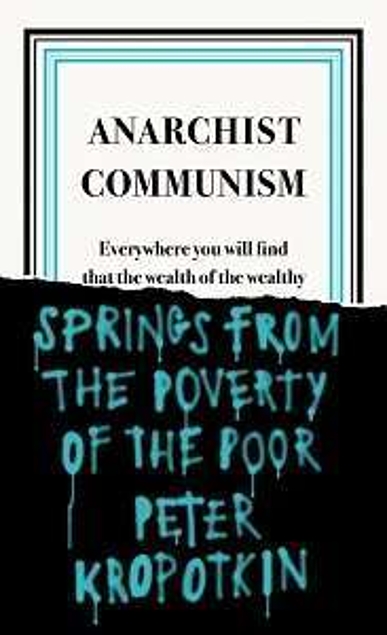Peter Kropotkin "Anarchist Communism " (Penguin Great Ideas)

In Anarchist Communism: Everywhere You Will Find that the Wealth of the Wealthy Springs from the Poverty of the Poor, Peter Kropotkin writes, “We cry shame on the feudal baron who forbade the peasant to turn a clod of earth unless he surrendered to his lord a fourth of his crop. We called those barbarous times. But if the forms have changed, the relations have remained the same, and the worker is forced, under the name of free contract, to accept feudal obligations. For, turn where he will, he can find no better conditions. Everything has become private property, and he must accept, or die of hunger” (pgs. 12-13). Kropotkin continues, “It is high time for the worker to assert his right to the common inheritance, and to enter into possession of it” (pg. 34). In his titular essay, Kropotkin argues the folly of individualism, explaining how various institutions already demonstrate the ability to work for the common good, including inclusive rail lines, museums, libraries, and even the field of science – though he describes science in the sense of late-nineteenth-century scientific discovery prior to that practiced by modern industrial capitalists and their global corporations.
This Penguin “Great Ideas” edition of Kropotkin’s work is a nice, inexpensive way to get a hardcopy of his work for scholarly analysis or use in the classroom. It is worthy of study by those re-examining the current socioeconomic systems in the West that exist to accumulate wealth and power in the hands of a few individuals but should be read alongside other political works to place it in context and realize that no one text will furnish all the answers.

In Anarchist Communism: Everywhere You Will Find that the Wealth of the Wealthy Springs from the Poverty of the Poor, Peter Kropotkin writes, “We cry shame on the feudal baron who forbade the peasant to turn a clod of earth unless he surrendered to his lord a fourth of his crop. We called those barbarous times. But if the forms have changed, the relations have remained the same, and the worker is forced, under the name of free contract, to accept feudal obligations. For, turn where he will, he can find no better conditions. Everything has become private property, and he must accept, or die of hunger” (pgs. 12-13). Kropotkin continues, “It is high time for the worker to assert his right to the common inheritance, and to enter into possession of it” (pg. 34). In his titular essay, Kropotkin argues the folly of individualism, explaining how various institutions already demonstrate the ability to work for the common good, including inclusive rail lines, museums, libraries, and even the field of science – though he describes science in the sense of late-nineteenth-century scientific discovery prior to that practiced by modern industrial capitalists and their global corporations.
This Penguin “Great Ideas” edition of Kropotkin’s work is a nice, inexpensive way to get a hardcopy of his work for scholarly analysis or use in the classroom. It is worthy of study by those re-examining the current socioeconomic systems in the West that exist to accumulate wealth and power in the hands of a few individuals but should be read alongside other political works to place it in context and realize that no one text will furnish all the answers.
no subject
Date: 2021-12-28 10:23 am (UTC)